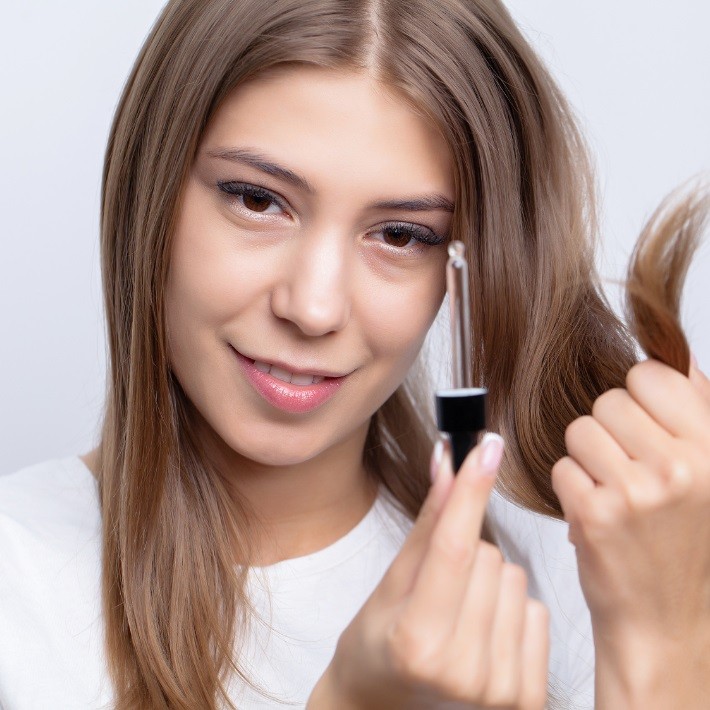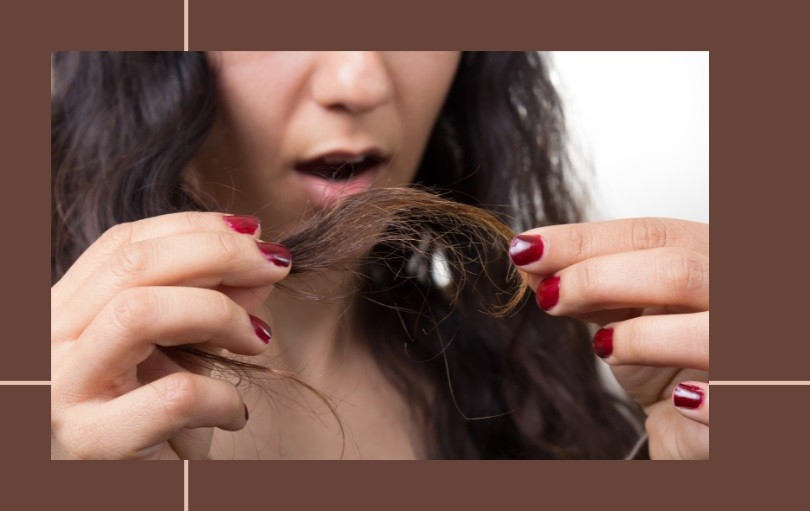Last Updated on March 28, 2025
Yes, split ends can impede hair growth. Split ends happen when hair fibers split into two or more parts, and they can cause breakage and damage to the hair shaft.
The damage and breakage can extend up the hair strand and lead to slower growth. Split ends are a common hair problem, and factors that contribute to their appearance include the use of harsh styling products, heat styling, chemical treatments, and excessive brushing.
We’ll discuss the effect of split ends on hair growth, explore the causes, symptoms, and prevention of split ends, and offer tips to help you control and manage split ends. By understanding how to prevent and treat split ends, you can help your hair grow long, strong, and healthy.
The Science Behind Split Ends And Hair Growth

Have you ever wondered whether split ends have any impact on hair growth? Many people believe that split ends impede hair growth, but is this true? In this section, we’ll dive into the science behind split ends and hair growth, exploring how split ends occur, their implications on hair growth, and the impact of hair care practices on split ends and hair growth.
The Structure Of Hair Strands
Before we delve into split ends, it’s important to understand the structure of hair strands. Each hair strand has three layers: the medulla, cortex, and cuticle. The medulla is the innermost layer and is only present in thick hairs, while the cortex is the middle layer, and it determines the hair’s strength, color, and texture.
The cuticle is the protective outer layer of hair that covers the cortex.
Related: How To Manage Split Ends On Curly Hair?
How do Split Ends Occur?
Split ends occur when the protective cuticle layer of the hair is damaged or wears away, leaving the cortex of the hair exposed. This can happen for a variety of reasons, including using harsh hair treatments, excessive heat styling, and brushing hair when it’s wet.
Once the cuticle layer is damaged, the inner cortex of the hair becomes susceptible to breakage, causing the hair to split. Split ends can continue to travel up the hair shaft, causing more damage and worsening the condition of the hair.
The Implications Of Split Ends On Hair Growth
It’s widely believed that split ends can impede hair growth, and while split ends don’t directly affect hair growth, they can impact the health of hair and scalp. Split ends make the hair appear dull, lifeless, and brittle, causing hair to break off before it’s had the chance to grow to its full length.
Additionally, split ends can lead to hair breakage and hair loss, which can interfere with hair growth and leave hair looking thinner and less vibrant.
The Impact Of Hair Care Practices On Split Ends And Hair Growth
Preventing split ends is crucial to maintaining healthy hair growth, and it’s essential to adopt proper hair care practices to keep split ends at bay. Here are some tips to prevent split ends:
- Avoid over-washing your hair
- Use a heat protectant before heat-styling your hair
- Use a wide-tooth comb to detangle wet hair instead of a brush
- Trim your hair regularly to prevent split ends from traveling up the hair shaft
By following these hair care tips, you’ll be able to maintain healthy hair growth and keep your locks looking their best.
Split ends can impact the overall health and appearance of hair, but they don’t directly impede hair growth. By maintaining proper hair care practices and preventing split ends, you can keep your hair healthy and vibrant, allowing it to grow to its full potential.
Related: Does Dyson Airwrap Damage Hair
Myth Vs. Reality: Do Split Ends Really Stop Hair Growth?
Unsightly split ends can occur when the protective outer layer of the hair cuticle gets damaged, causing the hair strand to split at the end. Split ends not only make hair look dull and unhealthy but they also have long been thought to impede hair’s growth.
In this section, we uncover the truth about split ends’ impact on hair growth to understand whether this belief has any merit or not.
Common Beliefs About Split Ends And Hair Growth
Many people believe that split ends can prevent hair growth, but is that a myth or reality? Let’s explore the common beliefs about split ends and hair growth:
- Split ends can travel up the hair shaft and cause breakage: This is true, and it can cause hair to look shorter and thinner, but it does not stop hair from growing.
- Split ends can cause hair to stop growing: This is not true. Split ends occur at the ends of the hair shaft and do not affect the hair’s growth from the scalp.
- Cutting split ends boosts hair growth: It’s a common belief that trimming split ends can promote hair growth, but it’s not true. Cutting split ends merely prevents the hair strand from breaking off higher up the shaft, and it does not affect the rate of hair growth.
The Truth About Split Ends’ Impact On Hair Growth
When it comes to split ends and hair growth, the truth is that split ends do not stop hair from growing. Here are some facts to consider:
- Hair grows from the scalp, not the ends: The growth rate of hair is determined by genetics and other factors like age, health, and nutrition, not by the hair’s ends.
- Split ends can weaken hair: Hair with split ends has a higher tendency to break, which can make it appear as hair growth has stopped.
- Split ends can make hair look shorter: When hair splits higher up the shaft, it can make hair look shorter than it is and can affect the hair’s volume.
Ways To Prevent Split Ends And Promote Hair Growth
Taking care of your hair can prevent split ends and promote hair growth. Here are a few tips to follow:
- Get regular trims: While trimming split ends does not promote hair growth, getting regular haircuts can prevent split ends from traveling up the shaft, resulting in hair breakage.
- Avoid heat styling: Overuse of heat styling tools like straighteners and curling irons can cause hair to become dry, brittle, and prone to split ends.
- Protect your hair before swimming: Chlorine and salt water can cause hair to become dry and brittle. Wear a swim cap or wet your hair with clean water before swimming to prevent hair from soaking up too much chlorine.
- Use a deep conditioner: Moisturizing your hair with a deep conditioning treatment can help repair and prevent split ends.
While split ends can make hair look unhealthy and broken, they do not stop hair from growing. Nonetheless, taking care of your hair can prevent split ends, promote healthy hair growth, and make hair look vibrant and shiny.
Related: How Long Does It Take For Hair To Grow Back?
Frequently Asked Questions On Do Split Ends Stop Hair Growth?

What Causes Split Ends In Hair?
Split ends are caused by excessive heat, chemical treatments, and mechanical damage such as brushing or pulling.
Can Split Ends Be Repaired?
Split ends cannot be fully repaired, but you can prevent further damage with regular trims and deep conditioning treatments.
How Often Should I Trim My Hair To Prevent Split Ends?
You should trim your hair every 6-8 weeks to prevent and manage split ends.
Will Cutting Split Ends Make My Hair Grow Faster?
Cutting split ends may improve the appearance of hair and prevent further damage, but it does not promote faster hair growth.
Do Split Ends Cause Hair Breakage?
Yes, split ends can lead to hair breakage if not properly managed. Regular trims and deep conditioning treatments can help prevent breakage.
Conclusion
After reviewing all the information about split ends and hair growth, it is clear that preventing split ends is important for maintaining healthy hair. While split ends themselves do not directly stop hair growth, they can lead to hair breakage and damage, which can result in slower growth or hair loss over time.
By keeping hair moisturized, avoiding heat styling and chemical treatments, and getting regular trims, you can reduce your risk of split ends and keep your hair healthy and growing. Additionally, incorporating a well-rounded diet and taking vitamins may help support overall hair health.
Remember that while split ends may seem like a small issue, they can have a big impact on the health and growth of your locks. So, take care of your hair and watch it thrive!

